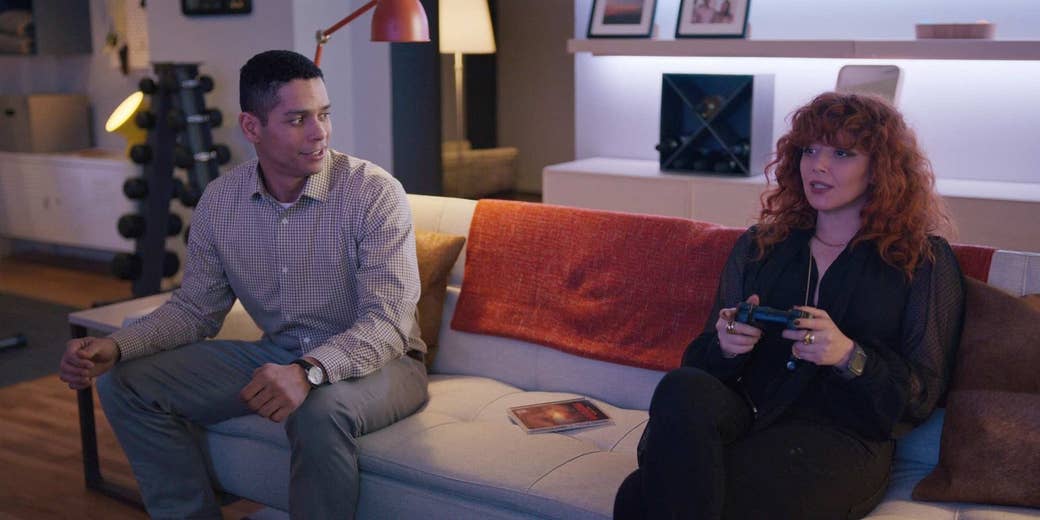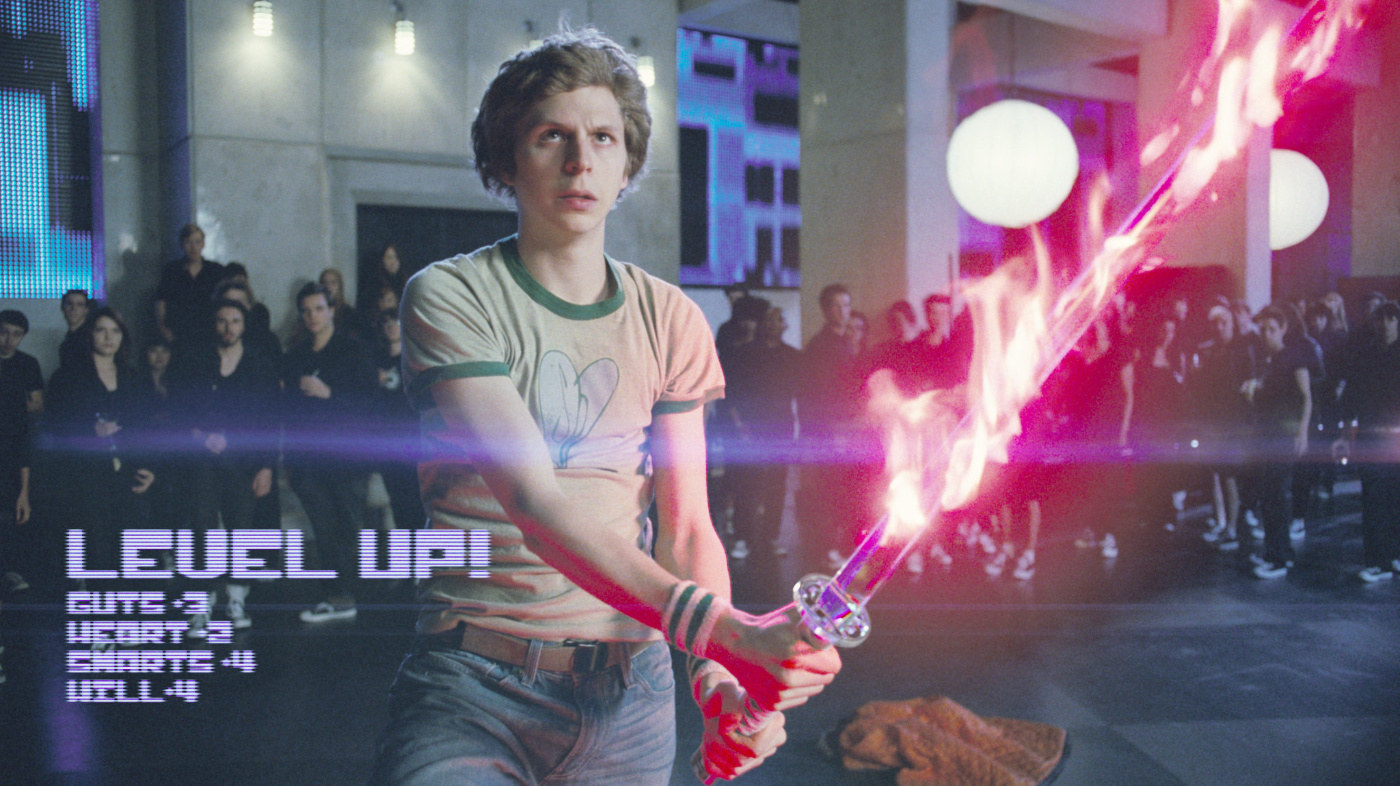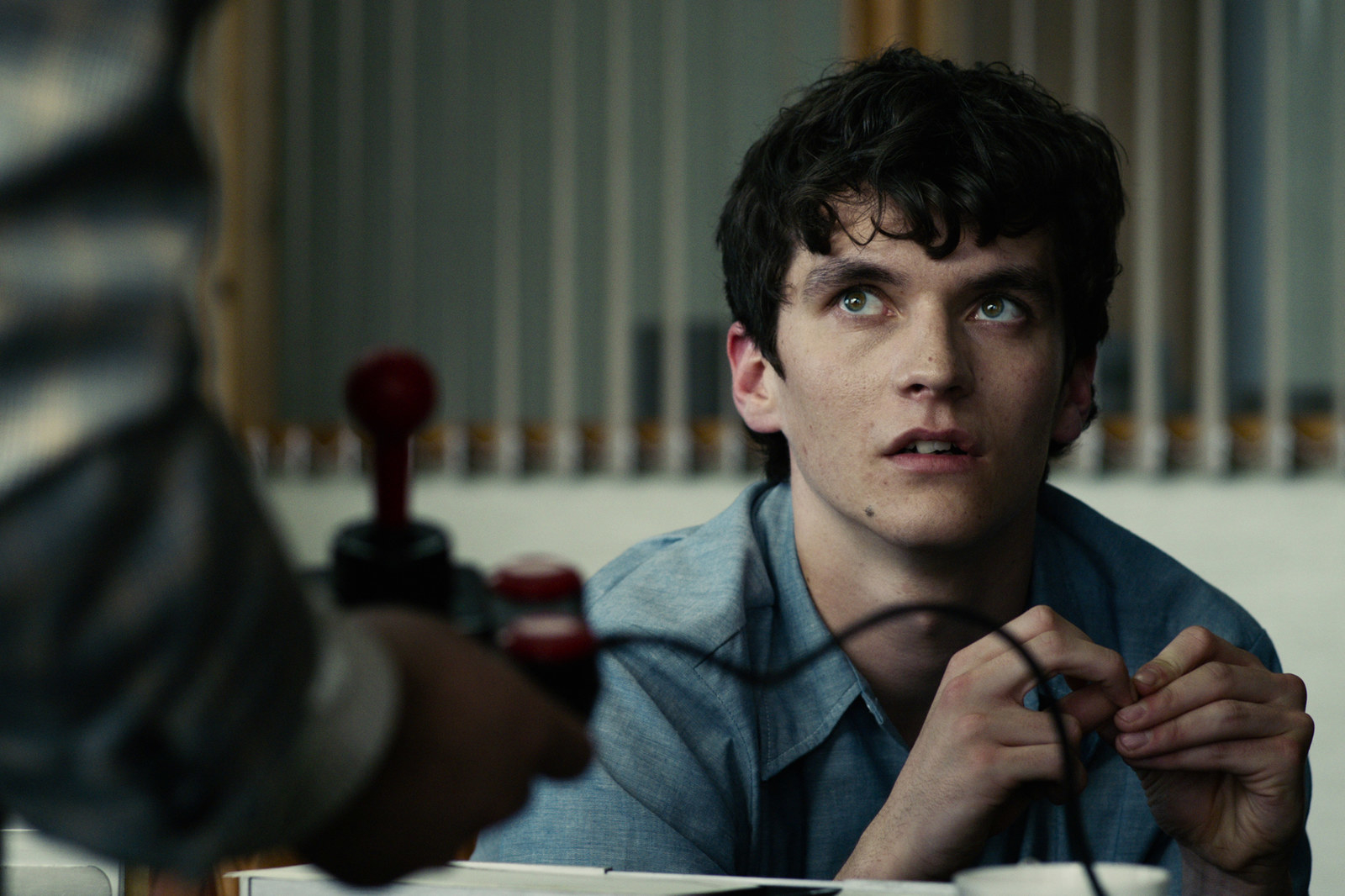
Nadia Vulvokov (Natasha Lyonne), the curly-crowned heroine of Russian Doll, may be a tough cookie, but she's not a badass in the action sense — no weapons wielded, bosses battled, or obstacles evaded. She has a tough enough time just navigating stairs that, after a few gruesome tumbles, she starts skipping them in favor of going out the fire escape. Nadia is a 36-year-old New Yorker with a garden apartment, a seemingly steady freelance career as a programmer, and a near-pathological insistence on independence that extends to the free-roaming cat she shares ownership of with her local bodega. She's a decidedly real-world woman with real-world problems. Yet Nadia is effectively trapped inside a video game.
Russian Doll, a Netflix series created by Lyonne, Leslye Headland, and Amy Poehler, is about how Nadia finds herself dying and then returning, again and again, to a bathroom in the midst of her own birthday party. It's a premise that owes an obvious debt to Groundhog Day, which it tipped a hat to with its Feb. 1 premiere date, right before the holiday on which the Harold Ramis classic takes place. But Russian Doll isn't just an adventure in time-looping; it's also an experiment in applying gameplay logic to the kind of story that isn't generally the stuff of mainstream video games — a decision underscored by the fact that Nadia is herself a game developer.
As self-described "huge gamer," Headland put it to Polygon's Karen Han, "To me, the analogy is a little bit more like, 'What if life treated you the way that a video game treats you, which is that you can't move forward until you accomplish this thing, and you're just not allowed to until you accomplish this thing?'" Nadia is functionally stuck at a save point, unable to get past this particular stage in her life. She isn't sure what the rules even are (and really, who is?). And one of the reasons Russian Doll works so well is because it doesn't treat this idea as a gimmick, or as something that requires an asterisk and further explanation, but as a concept that's as ingrained in contemporary pop culture as any basic film or television reference.
Nadia is functionally stuck at a save point, unable to get past this particular stage in her life.
Russian Doll is the best and brightest of a few recent titles — including "Bandersnatch," December's "choose your own adventure"–style episode of the Netflix anthology series Black Mirror, and the majestically strange January flop Serenity — that don't just try to channel some aspect of game logic but also happen to include a central character who's in the business of creating games. They're not adaptations — not efforts to cash in on the audience of a specific title by bringing it to the big or small screen. Instead, their game-inspired structures acknowledge the degree to which gaming has been ingrained in our cultural consciousness for multiple generations now, seeping into how stories get told rather than just influencing which ones get chosen. In Russian Doll, "Bandersnatch," and Serenity, games act as a canvas on which characters' dramas play out, serving as a refuge from — as well as a reflection of — personal turmoil.
That represents a small but significant shift, because video games, despite being a massive global business, are still often looked at askance by mainstream Hollywood — regarded as immature, or geeky, or niche. When games do get translated into film, the focus is inevitably on plot and imagery and not the actual experience of playing, the thing that's unique to the medium and key to its appeal. Games have gotten exponentially more sophisticated over the years, but the best that can be said about Hollywood's continuing endeavors to convert them into big-screen hits — ever since Bob Hoskins and John Leguizamo jumpsuited up to play Mario and Luigi in Super Mario Bros. back in 1993 — is that at least they're no longer resulting in some of the worst movies ever made.
Last year's Rampage and the Tomb Raider reboot starring Alicia Vikander managed to feel just like generic blockbusters — the sort of things you'd start watching on a plane, only to realize you'd actually already seen them in theaters. If you weren't acquainted with the games they're based on (much more likely for the former, an '80s arcade standard, than the latter, a famous franchise that already spawned two Angelina Jolie vehicles), you might not realize that they were adaptations at all. But the fact that movies like this seem content to succeed in spite of their source material, rather than because of it, means there's a vast territory still left to be explored in terms of the actual mechanics of gaming and how something fundamentally interactive might be translated to the mostly passive worlds of film and TV.
There are, of course, movies about gaming, which run the gamut from silly to celebratory to cautionary. There were the raveworthy visuals of Tron (1982) and nu-Tron (2010), and the failed jokiness of Adam Sandler's 2015 gamer-saves-the-world movie Pixels versus the unintentional darkness of Steven Spielberg's 2018 attempt Ready Player One. eXistenZ offered up an unforgettable body horror–inflected vision of gaming that included spinal ports in 1999, while 10 years later Gamer provided a gleefully trashy one in which death row prisoners got turned into live-action avatars controlled by the wealthy in a fight to the death.

The first season of Westworld angled its high-tech theme park as an open-world game full of visitors opting to either embark on missions or just run around wreaking havoc without consequences. And there are plenty of action movies that haven't needed to be explicitly about games to seem like they're pulling from them — The Raid (2011) and Snowpiercer (2013) echo how it feels to wind your way up through levels. Edge of Tomorrow (2014) shares a looping device with Russian Doll, only it's in service of letting Tom Cruise figure out how to defeat an alien invasion reminiscent of countless first-person shooters.
Then there's Edgar Wright's 2010 Scott Pilgrim vs. the World, an even closer sibling to Russian Doll that stars Michael Cera as the Toronto slacker of the title trying to win over the girl of his dreams, Ramona Flowers (Mary Elizabeth Winstead). That he has to do so by way of a series of fighting game–style battles with her exes becomes a splashy expression of his struggle to get over his own insecurities about her dating history. The movie bombed when it came out, though its subsequent ascent to cult status suggests it was ahead of its time in what it was trying to do — treat game language as a legitimate vehicle for a character's growth, and as a narrative frame capable of sustaining themes beyond winning and losing.
Russian Doll goes even deeper by setting Nadia on an eventual collision course with fellow time-looper Alan (Charlie Barnett). At first the two bicker over what's happening to them (Are they in purgatory? Are they the same person?), and they might as well be arguing over what kind of game they've been coded into on the way to figuring out how to finish it. But it's the journey that ends up mattering — the actual end goal is a sort of MacGuffin, a way to get Nadia and Alan to come together, to open up, and to become the kind of people who might notice a stranger in pain and try to help them. The premise is heightened; the emotions are grounded and relatable.

Russian Doll touches on childhood pain and urban isolation; the Black Mirror installment (and possible data mining venture) "Bandersnatch" does too, but it's also a gradually fragmenting portrayal of mental illness. Like Nadia, Stefan (Fionn Whitehead) is a game developer, as well as someone who feels guilt about the death of his mother. Unlike Nadia, he exudes fragility from the start — he's a withdrawn young man living at home with a hovering father whose concern hints at problems in the past. It's the '80s, and Stefan lands his dream gig when a company greenlights his proposed project, only to start falling apart under the stress of having to write the whole thing on his own.
Which, of course, he chooses to do — only he doesn't, really, because we choose it for him, dictating Stefan's behavior through a series of branching options that turn him into a kind of playable character. Stefan becomes consumed with the idea that he's being manipulated from on high, leading him down various dark paths. "Bandersnatch" is, even by the devoutly bleak standards of Black Mirror, punishingly grim, and queasy in its suggestions that refusing to collaborate and going off your meds are both key to making better art. But it's also ingenious in how its game-mimicking structure becomes a representation of Stefan's feelings of being out of control, of being powerless over his own behavior.
The characters in Serenity, a January thriller written and directed by Steven Knight, also have revelations about who's determining their actions, though the movie's commitment to expressing trauma through gaming is considerably wackier. (Fair warning: Delving into its secret electronic heart requires major spoilers.) Matthew McConaughey stars as a fishing boat captain named Baker Dill, and Anne Hathaway is Karen, the ex he had a child with but who left him for a brutal husband she's now hoping to have disappeared. It looks like a sultry Florida Keys neo-noir, but something's off — about the characters, about the increasingly dreamlike setting, and about what the dramatic stakes actually are.

Baker, who seems to have a mental link with the son he hasn't seen in years, a kid who's apparently taken refuge from his parents' fighting in gaming and coding, is otherwise obsessed with fishing. He's consumed with it, and with catching a particular tuna he's named Justice, his white whale and the center of his otherwise uncluttered life. The strangeness of this fixation, and of Baker's routine in general, is eventually explained by an incongruously business-suited salesman played by Jeremy Strong. He turns up to drop the bomb that none of this is real: Baker, Karen, and everyone else are actually characters in a fishing video game the boy coded himself, which he has recently tweaked in order to have Baker, a stand-in for his late father, kill an in-game avatar of his abusive stepdad.
It's a reveal that only the incredibly stoned could love — and yet it's mesmerizing just how earnest Serenity continues to be after that off-the-rails twist, and after its swaggering main character learns that he's nothing more than a digital ghost whose passions are nothing more than programming, a receptacle for the grief and rage of a godlike child behind a keyboard out in the real world. The premise glitches if you poke at it even a little, and any suspense the film has built up dissipates immediately on contact with the surprise. But there's still something compelling in the movie's deep conviction in depicting how a game can provide solace from turmoil. Where so many direct screen adaptations of games end up making their source material feel frivolous and small by plucking out the narratives and leaving behind the immersive experience those narratives support, Serenity, which is based on nothing in particular except Knight's own imagination, careens (wildly) in the other direction.
There's still something compelling in the movie's deep conviction in depicting how a game can provide solace from turmoil.
As ridiculous as the movie may be, there's something to be said for how evenhandedly Serenity treats its storytelling touchstone — for how little it feels it has to explain why the rhythms of a mindless fishing game can provide an escape from the ugliness of a household rife with domestic violence, even if you also for some reason needed to plunk your (frequently naked) dead dad in there. That's true for Russian Doll and "Bandersnatch" too, as much as they vary in tone. There's never a hesitation about the pairing of game logic and sometimes intensely heavy themes.
And, in the case of Russian Doll, those traces of gameplay become as poignant as they are playful. The juxtaposition of Nadia's pre–midlife crisis with the way she dies and comes back, experimenting with different routes through the minefield of her life like she's being steered by someone with a whole roll of quarters, is funny. But there's a plaintive quality too, in this portrait of a woman intent on charging, unchanging, through her own existence, never leaving the level at which she's been most comfortable. When Nadia's friend Maxine (Greta Lee) fondly refers to her as a cockroach — or a "kakaroach," per Lyonne's indelible pronunciation — Nadia's wounded by it in a way that seems to come as a surprise even to her. No one likes to be compared to a hard-to-eradicate pest, the city dweller's equivalent of a low-level but forever respawning enemy.
But it's one thing to think of yourself as a hilariously hard-boiled broad who can bounce back from anything. It's another to learn that other people in your life think of you that way as well, as possessing infinite lives, of being invulnerable and static, not quite human or in need of human comforts. Being able to hack it on your own doesn't mean you have to or should go without personal connections, something Nadia comes to accept over the course of the season. It's a lesson, as Alan points out, that she unknowingly wrote into a video game she created and he owns, a game he doesn't like because of its exasperating difficulty. In evolving, Nadia doesn't just grow as a person, but also, maybe, as an artist. And in her journey, you can see film and TV growing too, and coming around to a medium that has become too big, and been around too long, to keep treating it as a novelty. ●
